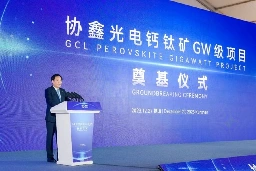At Intersolar Europe, the Chinese manufacturer said the perovskite-silicon tandem module would cost 50% of a crystalline silicon module that costs $0.15 per W, meaning $0.075 per W.

The United States and China appear locked in a race to weaponize four-legged robots for military applications.

French day-ahead power fell to -€5.76 a megawatt-hour, the lowest in four years, in an auction on Epex Spot.

A Wyoming man wants an AI named VIC to be on Cheyenne's mayoral ballot. Authorities in the state are questioning the AI's legality.

When old satellites fall into Earth's atmosphere and burn up, they leave behind tiny particles of aluminum oxide, which eat away at Earth's protective ozone layer. A new study finds that these oxides have increased 8-fold between 2016 and 2022 and will continue to accumulate as the number of low-Ear...

Murthy cited research in his op-ed for the New York Times that shows social media has been a major contributor to the mental health crisis among young...

Extreme weather threatens the investment value of many properties, but financing for climate mitigation efforts are only just getting going.

SoftBank is using AI to combat customer harassment in call centers. Its "emotion canceling" technology softens angry customers' voices.

The New York Times' union is claiming that the paper is firing human artists to replace them with artificial intelligence.

Parents around the globe are making decisions about how many kids to have, where to work and what to buy based on climate change.

Damning new report finds nearly all major car companies are actively sabotaging world's efforts to avoid catastrophic global warming, and Japan companies are the worst.

We’ve decided to go ahead with this, fire over a DM and we’ll get the community set up
The photographers strike back.

Norwegian mining company Rare Earths Norway (REN) announced that after three years of exploration, it has discovered Europe's largest proven deposit of rare earth elements.

HCFCs were a temporary replacement for CFCs, the initial subject of the 1987 Montreal protocol.

A company run by former Google boss Eric Schmidt has been testing AI-guided drones in Silicon Valley and Ukraine, Forbes reported.

A wafer-thin battery is in development that may be ideal to power smart contact lenses in the future. And it has an unusual way of being recharged.

New analysis reveals potential for economic and environmental benefits of global basic income.

The world faces a “staggering” surplus of oil equating to millions of barrels a day by the end of the decade, as oil companies increase production, undermining the ability of Opec+ to manage crude prices, the International Energy Agency has warned.
While demand is forecast to peak before 2030, continued investment by oil producers, led by the US, would by then result in more than 8mn b/d of spare capacity, the IEA wrote in its annual report on the industry released on Wednesday.
This “massive cushion” of extra oil could “upend” the efforts of Opec+ to manage the market and usher in an era of lower prices, the IEA said, adding that the level of spare capacity would be unprecedented outside the coronavirus pandemic.
“It is not the first time the oil markets would see an oversupply, but one important outcome would be downward pressure on the prices,” said Fatih Birol, the agency’s director.
He added the combination of slowing demand and rising supply “could have substantial implications” for oil companies. “It is time for many producers to look at their business plans, in my view.”
The Paris-based body, founded in the aftermath of the 1970s Arab oil embargoes to advise on energy security, said last year that the world was at “the beginning of the end” of the fossil fuel era. It has said demand for oil, natural gas and coal will all start to fall before the end of the decade amid the mass rollout of renewable energy and electric vehicles
But its projections have been decried by the oil industry, particularly in the Middle East and the US, where producers are stepping up their investments in pumping more crude.
Global capital spending on oil and fields rose to $538bn in 2023, the highest level since 2019 in real terms. The increase in investment was largely driven by state oil companies in the Middle East, which increased their spending to twice the levels seen 10 years ago, and China.
Haitham Al Ghais, Opec general secretary, has described the IEA forecasts as “dangerous”, and warned of “energy chaos on a potentially unprecedented scale” if producers stopped investing in new oil and gas.
In its new report, the IEA called into question whether Opec+ would be able to expand future production, as it continued to be squeezed by countries outside the alliance, especially the US.
“This year, [the Opec+] total oil market share has dropped to 48.5 per cent, the lowest since it was formed in 2016, due to its sharp voluntary output cuts,” the IEA noted. It added that even if Opec+, a wider group that includes Russia, continued its deep cuts, it “would pump above the call on its crude oil to varying degrees from 2025 through 2030”.
Birol outlined three main drivers for oil demand to peak by the end of the decade: reduced petrol use as the world switches to electric vehicles, a move by countries in the Middle East, especially Saudi Arabia, to switch from oil to renewables to generate electricity, and a lower future growth rate in China.
“Perhaps the most important factor comes from China,” he said. “In the last 10 years, about 60 per cent of global oil demand growth came from China alone.” The IEA said it expected the 6 per cent annual growth the Asian country had registered in that period to fall to about 4 per cent a year in its forecast period.
The future drivers of growth would include more aviation and the “booming petrochemical sector”, Birol said. The IEA also expects petrol use to increase in India as more drivers hit the roads.
Meanwhile, oil demand in OECD countries, which peaked in 2007, would fall to 1991 levels by 2030. The IEA has assumed 3 per cent annual global economic growth for the rest of the decade.
The IEA cautioned its forecast for shrinking oil demand could be derailed by “relatively minor changes” in events. For example, a 0.3 per cent annual increase in the world’s GDP growth, a $5 annual drop in real oil prices, or a 15 per cent slowdown in the rollout of EVs would each be enough to swing oil consumption back to growth by the end of the decade.
I'll have a chat with the other mods and come back to you
We are not against it, but it needs careful consideration due to limited server resources as well as limited user attention (we are a very small instance compared to others)
Chinese scientists say further research on potential harm to reproduction from contamination is ‘imperative’

I assume it will be an expensive treatment
Thanks for your support, it's really appreciated
Weird, I just used the autogenerate title so the wired site must have had it wrong. Updated
Despite reports of it's death, moores law continues at pace. I've already got a computer in my pocket more powerful than the supercomputers of the previous few decades.
We can't even pay people a decent wage, no way will people vote for parties just giving money away for free.
I left reddit after the API nonsense (which was to stop AI companies scraping their content), and I could see them selling their content for AI (or creating their own AI) coming a mile off. It's only ever about money
I'm not convinced that ChatGPT is the right way to AGI but watching the demos of GPT4 omni and seeing these cheap robots does make it feel like the next 5 years are going to be ... interesting times shall we say.
Brain is about 1 million mm3, so yeah, 1.4 zettabytes
They are on twitter: https://twitter.com/ModdedQuad
In the weeks following the surgery, a number of threads retracted from the brain, resulting in a net decrease in the number of effective electrodes.
That doesn't sound great
The text is just copy and pasted from the article. I've not spent any time sanitizing it, apologies
Apologies, I've edited the post to take these out. I just copy and pasted from top to bottom
The number of groups lobbying the U.S. federal government on artificial intelligence nearly tripled from 2022 to 2023, rocketing from 158 to 451 organizations, according to data from OpenSecrets, a nonprofit that tracks and publishes data on campaign finance and lobbying. Data on the total amount spent on lobbying by each organization and interviews with two congressional staffers, two nonprofit advocates familiar with AI lobbying efforts, and two named experts suggest that large technology companies have so far dominated efforts to influence potential AI legislation. And while these companies have publicly been supportive of AI regulation, in closed-door conversations with officials they tend to push for light-touch and voluntary rules, say Congressional staffers and advocates.
In November 2022, OpenAI released its wildly popular chatbot, ChatGPT. Six months later, leading AI researchers and industry executives signed a statement warning that “the risk of extinction from AI should be a global priority alongside other societal-scale risks such as pandemics and nuclear war.” Lawmakers around the world sat up and took notice. U.S. President Joe Biden signed a sweeping AI Executive Order; the E.U. modified its landmark AI law to ensure the models that power chatbots like ChatGPT are regulated; and the U.K. government convened the world’s first AI Safety Summit.
Read More: The 3 Most Important AI Policy Milestones of 2023
While Congress has yet to pass any AI-specific legislation, there has been a flurry of AI-related activity on the Hill, with Senate Majority Leader Chuck Schumer convening “Insight Forums” to educate Congress on the rapidly-evolving technology. As substantial federal AI legislation began to be seen as a possibility, lobbyists flooded into the Capitol to promote their organizations’ interests.
“Obviously Congress has been writing bills on AI for a long, long time—this is not new. What's new is the scale at which Congress is writing bills and putting them out,” says Divyansh Kaushik, a vice president at D.C.-based advisory firm Beacon Global Strategies. “That's what's driving a lot of this engagement.” New faces
Of the 451 organizations that lobbied on AI in 2023, 334—nearly three quarters of the total number—did so for the first time in 2023. Present in the crowd of new organizations pushing for time with staffers and lawmakers on the Hill were the relatively young companies building the most advanced AI models, such as OpenAI, Anthropic, and Cohere.
The OpenSecrets data is an imperfect measure; it tracks AI-specific lobbying by searching the lobbying disclosure forms that organizations are required to file quarterly for the words “artificial intelligence” or “AI.” Two Congressional staffers TIME spoke with suggested that the number of lobbyists they personally had met with remained roughly the same. However, they said AI has become a much more common topic of discussion. “Everybody who comes in and talks to us and wants to talk about AI,” said one Congressional staffer, who asked to remain anonymous as they weren’t authorized to speak about discussions with lobbyists and advocates.
For example, companies such as payment card company Visa, pharmaceutical conglomerate GSK, and accounting firm Ernst and Young began to mention AI in their lobbying disclosure forms. Company interests were also represented by industry trade associations, such as BSA The Software Alliance. Venture capital firm Andreessen Horowitz and startup accelerator Y Combinator also lobbied on AI for the first time in 2023, according to the OpenSecrets analysis.
Many civil society organizations lobbied on AI issues for the first time in 2023, too. The American Federation of Labor and Congress of Industrial Organizations—the largest U.S. federation of trade unions—joined the fray, as did top civil rights organization the NAACP. More tech-focused civil society organizations, such as the Omidyar Network and the Mozilla Foundation also joined the fray. Non-profit organizations focused on threats that future AI systems could pose to public safety such as the Center for AI Policy and the Center for AI Safety Action Fund also filed lobbying disclosures for the first time this year. Finally, a number of universities, such as the Massachusetts Institute of Technology and Yale University reported lobbying on AI in 2023. Big Tech’s deep pockets
All organizations that carry out lobbying, the legal definition of which only includes directly discussing specific laws or regulations, are required to report how much they spent on lobbying. However, this data is only reported as a general total figure, meaning it’s impossible to know how much of this total amount each organization is spending on AI-related lobbying specifically, versus other policy issues. But by this crude metric, many of the newcomers are significantly outspent by the big technology companies, which have been ramping up their lobbying expenditures for a decade.
In 2023, Amazon, Meta, Google parent company Alphabet, and Microsoft each spent more than $10 million on lobbying, according to data provided by OpenSecrets. The Information Technology Industry Council, a trade association, spent $2.7 million on lobbying. In comparison, civil society group the Mozilla Foundation spent $120,000 and AI safety nonprofit the Center for AI Safety Action Fund spent $80,000.
Given that the definition of lobbying only includes speaking with staffers about specific laws, these figures likely underestimate the amounts of money that tech companies are spending to influence lawmakers, says Hamza Chaudhry, a U.S. Policy Specialist at the Future of Life Institute, a nonprofit that focuses on risks posed by advanced technologies.
Multiple advocates and Hill sources suggested that the consistently large amounts spent by the big technology companies has allowed them to build up a sophisticated lobbying apparatus that has so far outgunned the efforts of other organizations. “There's been a sprouting up of all these AI safety lobby groups and also lots of civil society groups that now are starting up their AI focuses, but by far the best at it are the tech groups,” said another Congressional staffer, who also wished to remain anonymous because they weren’t authorized to speak about discussions with lobbyists and advocates. Tech companies are able to spend more and thus pay for more experienced lobbyists, who better understand the technical details of their brief better and have a more extensive network on the Hill, the staffer said.
“I would still say that civil society—and I'm including academia in this, all sorts of different people—would be outspent by big tech by five to one, ten to one,” says Chaudhry. Public statements vs. private lobbying
What exactly is the tech industry lobbying for? Some in the industry are against regulating AI, arguing that regulation would impede technological progress. In December 2023, Ben Horowitz, co-founder of venture capital firm Andreessen Horowitz, wrote a blog post that said his firm would support any political candidate who opposed regulation that would stifle innovation.
But, many of the companies involved in the development of AI have, at least in public, struck a cooperative tone when discussing potential regulation. Executives from the newer companies that have developed the most advanced AI models, such as OpenAI CEO Sam Altman and Anthropic CEO Dario Amodei, have called for regulation when testifying at hearings and attending Insight Forums. Executives from the more established big technology companies have made similar statements. For example, Microsoft vice chair and president Brad Smith has called for a federal licensing regime and a new agency to regulate powerful AI platforms. Both the newer AI firms and the more established tech giants signed White House-organized voluntary commitments aimed at mitigating the risks posed by AI systems.
But in closed door meetings with Congressional offices, the same companies are often less supportive of certain regulatory approaches, according to multiple sources present in or familiar with such conversations. In particular, companies tend to advocate for very permissive or voluntary regulations. “Anytime you want to make a tech company do something mandatory, they're gonna push back on it,” said one Congressional staffer.
Others, however, say that while companies do sometimes try to promote their own interests at the expense of the public interest, most lobbying helps to produce sensible legislation. “Most of the companies, when they engage, they're trying to put their best foot forward in terms of making sure that we’re bolstering U.S. national security or bolstering U.S. economic competitiveness,” says Kaushik. “At the same time, obviously, the bottom line is important.”
There is little time left for Congress to pass an AI-related bill before the presidential election. Whether an AI law is passed in the next few months, or not until the 119th Congress, lobbying efforts from all parties are only likely to increase as the legislation draws nearer.
Interesting stuff, what prompt did you use?
Limits to Growth predicts collapse though, so I rather hope it's not accurate
Very sad to hear this. Loved his books and his ideas were visionary at the time and mainstream now.
People who are into technology and the future also tend to enjoy space stuff?

